From Burden to Asset: Lebanon's Pathway to Resilience through Strategic Neutrality

Lebanon, with its stunning Mediterranean coastlines, mountainous terrain, and ancient cedar forests, has always been more than just a country; it's a vital artery and a historical crossroads. However, this very geography, while a source of historical prosperity, has paradoxically become its greatest curse, constantly pulling it into larger geopolitical conflicts.
In a world where small states—comprising between half and two-thirds of all nations—often exert influence diametrically opposite to their numbers, Lebanon finds itself in a precarious position. The global landscape also shows that these smaller states are increasingly vulnerable to external economic and environmental influences, such as overexposure to a single economic activity or the severe consequences of climate change. The Eastern Mediterranean, for instance, is warming at nearly twice the global average rate, with projections indicating a rise of up to 5°C by the end of the 21st century under a business-as-usual emissions scenario. This is coupled with a projected 20-40% decline in winter precipitation, directly impacting hydropower generation, food security, and livelihoods, and potentially allowing non-state armed groups to weaponize scarcer natural resources.
For Lebanon to escape this enduring cycle of vulnerability and external interference, it must intelligently transform its geographical burden into a strategic asset. This requires adopting a posture of active, indispensable neutrality, carefully navigating and leveraging the escalating US-China rivalry.
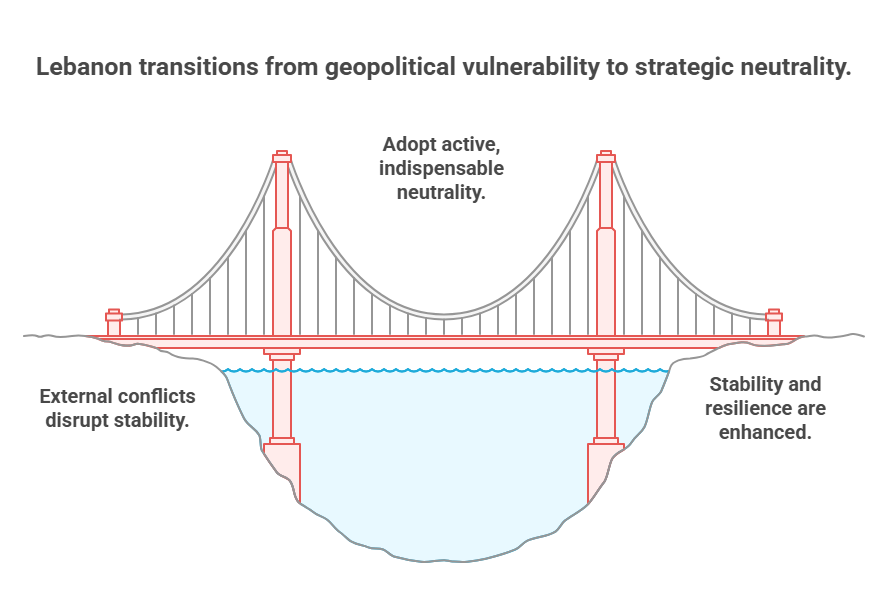
The "Excess of Geography": A Historical Burden (The Kissingerian View)
Lebanon’s history is replete with instances of external interference, a recurring pattern from ancient empires vying for control of its ports to modern regional powers using it as a proxy battleground. This "excess of geography" concept powerfully encapsulates how Lebanon's strategic location made it too important for external powers to ignore, leading to constant intervention. Meanwhile, its small size and internal divisions rendered it unable to fully control its own destiny against overwhelming forces.
Realist strategists, notably Henry Kissinger, often viewed Lebanon through the lens of its geopolitical utility and vulnerability, frequently perceiving it as a pawn rather than a sovereign agent. Indeed, many still debate the existence of a "Kissinger Plan" from the 1970s—an alleged conspiracy aimed at encouraging Lebanese Christians to leave the country to resettle Palestinian refugees. While Kissinger's primary focus was widely believed to be the resolution of the Israeli-Palestinian conflict to preserve Israel's integrity, direct planning for the "dechristianization of Lebanon" is considered pure speculation. However, his policy, which some analysts theorize included giving Syria's Hafez al-Assad the "green light" for military intervention in Lebanon in June 1976, ultimately helped undermine the country. This intervention led to a 15-year civil war, Syrian occupation until 2005, and the establishment of Hezbollah as an Iranian proxy.
In recent times, Lebanon's vulnerability has been further exposed by its severe economic crisis, which has led to widespread public dissatisfaction. A 2016 survey, for instance, found that 72% of respondents believed the country was heading in the "wrong direction." The public sector remains plagued by corruption, clientelism, and failed institutions, with critical services like electricity provision compromised for political gain rather than public good. Foreign aid, vital for reconstruction, often comes with strict reform conditions, such as those outlined in France's "roadmap to recovery" following the Beirut blast. Efforts by actors like Hezbollah to advocate for a larger Chinese role in Lebanon to counter US influence, citing potential investments of $12.5 billion, have not materialized due to Lebanon's instability and internal political divisions. Public opinion in Lebanon is divided on China's role, with Christians expressing concerns likely due to China's ties with Iran and Syria, while Shias largely support China, including for military aid to the Lebanese army.
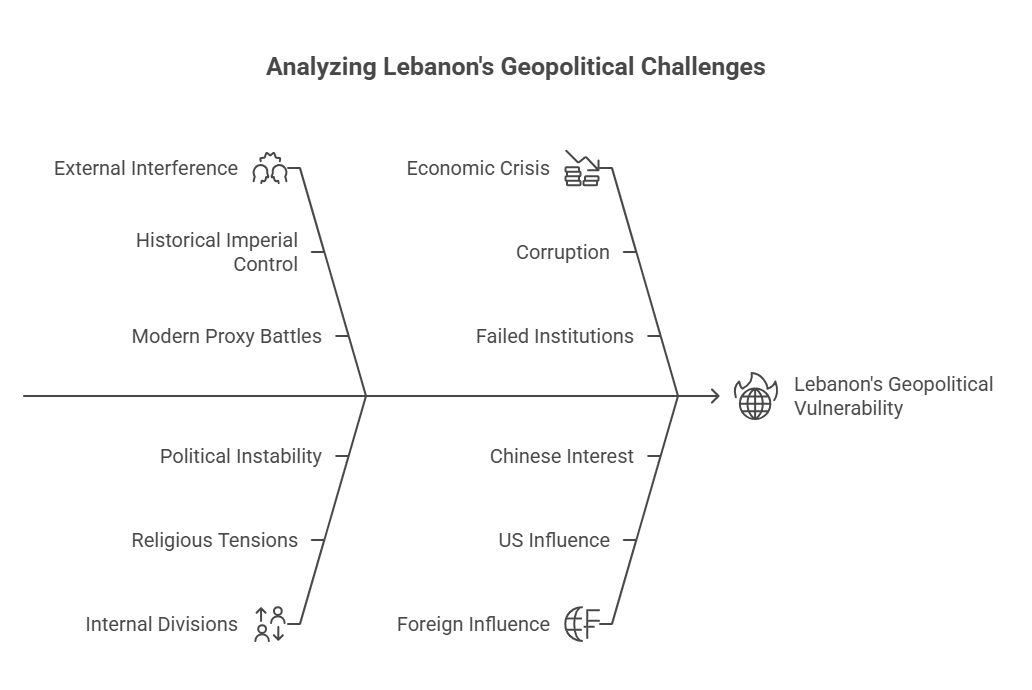
Beyond Passive Neutrality: Lebanon's Path to Active, Indispensable Neutrality
Traditional Lebanese "neutrality," often a form of passive avoidance or surrender, is insufficient to address its deep-seated challenges. Instead, Lebanon requires active, indispensable neutrality—a conscious, strategic foreign policy designed to make it valuable to global powers without aligning with any single one against another. This vision, however, hinges on a crucial precondition: a profound shift from Lebanon's fragmented political elite towards a cohesive, corruption-free national strategy focused purely on long-term Lebanese interests.
The prevailing "zero-sum, power-sharing mentality" must transform into one centered on the collective national interest and long-term strategic positioning. Overcoming the entrenched political mismanagement and corruption, which protestors have famously condemned with the chant “all of them means all of them,” is paramount for any meaningful change. Such a shift aligns with the strategies often employed by small states during armed conflicts, where effective communication and strategic narratives are crucial for survival. These narratives aim to gather international support, shape public perception by portraying themselves as the "good side," and deflect responsibility. Small states also leverage international organizations for security and influence, and exploit the competition between great powers to their advantage.
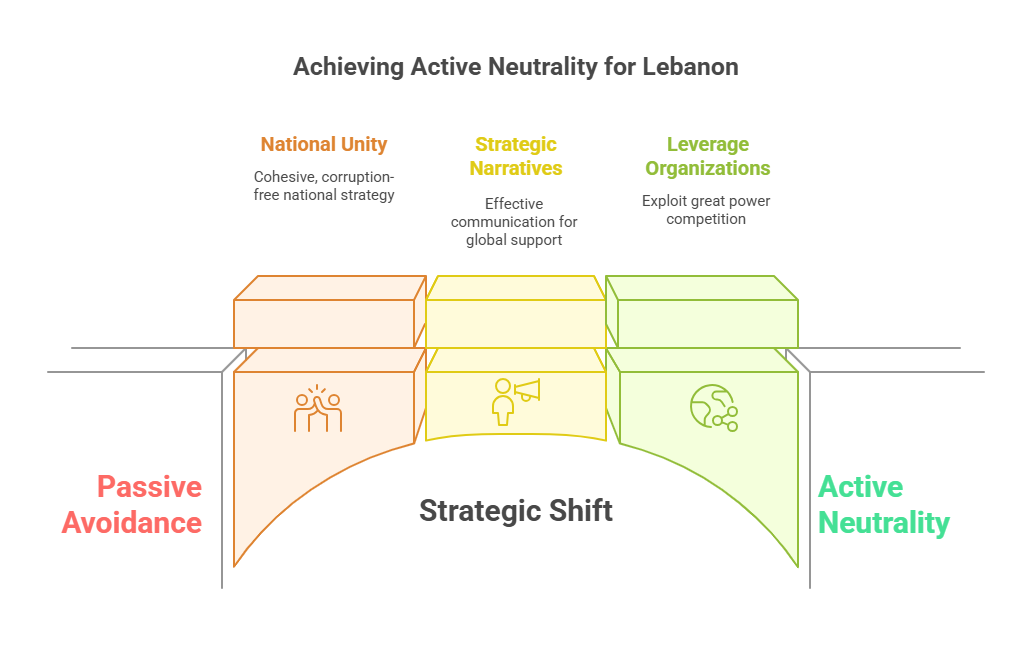
Specific Pillars of Leverage for Lebanon
Lebanon can transform its geographic predicament into a competitive advantage by developing specific areas of strategic leverage:
- Neutral Tech & Data Hub: The "Digital Switzerland" Model
- Lebanon can position itself as a secure, politically neutral "digital Switzerland"—a hub for data centers, cybersecurity services, and independent tech research and development (R&D). This strategy leverages the growing global need for digital sovereignty, which demands careful control over cloud, AI, and workplace tools, encompassing aspects like key custody, secure data transfer, and clear exit paths. Regulatory pressures are increasing globally, with new laws like the EU's AI Act, Data Act, DORA, and EUCS reshaping compliance landscapes.
- Such a hub could attract significant Foreign Direct Investment (FDI) from both US and Chinese tech giants seeking neutral ground in the region. FDI is crucial for sustainable development and economic growth, particularly when focused on modern sectors like technology, the digital economy, and R&D. Key to attracting this investment are robust regulatory frameworks, incentives, and efficient investment promotion agencies.
- The establishment of Digital Hubs, serving as centers of collaboration and innovation, provides essential innovation space, technology infrastructure, and improved education and training to maintain competitiveness in the digital era. These hubs can convert unproductive assets into active community spaces that foster local digital ecosystems and address digital divides. Essential needs identified for such hubs include networking opportunities, robust mentoring, access to markets, government support, funding, and skilled digital talents.
- Furthermore, Lebanon could enhance its digital infrastructure through Internet Exchange Points (IXPs), which are critical for accelerating data exchange and fostering local interconnection. IXPs stimulate growth in digital content industries, software development, and e-commerce, creating a ripple effect that propels economic diversification and job creation.
- Lebanon’s existing skilled, bilingual talent pool, capable of navigating both Western and Eastern business cultures, is a significant asset in this endeavor.
- Re-emerging Diplomatic Crossroads
- Lebanon's historical multicultural identity and its role as a bridge between diverse cultures and regions naturally position it as a potential discreet and respected venue for sensitive, unofficial (Track II) or even official dialogues between global powers.
- This role could mirror the successful "niche diplomacy" of other small states like Oman, which has effectively served as an intermediary due to its pragmatic foreign policy and trusted relationships, even facilitating the release of American hikers from Iran.
- Like Kuwait, Oman, and Qatar, which increasingly engage in international mediation as a foreign policy tool, Lebanon can leverage its unique position to build trust and facilitate dialogue. This approach aligns with "institutional hedging" strategies, where small states foster strong relationships with all potential parties and build multiple layers of cooperation to minimize risks and maintain flexibility in a shifting geopolitical environment.
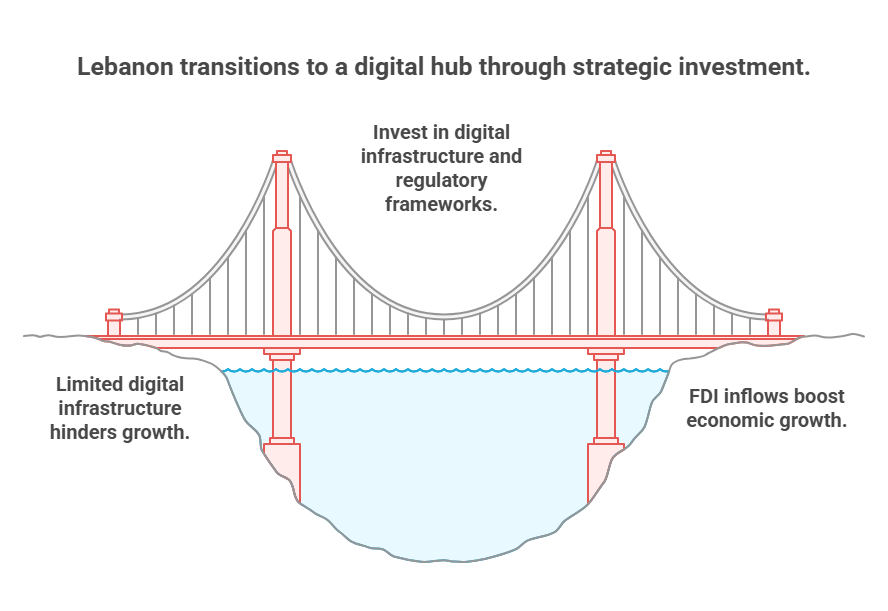
The Paradigm Shift: Reclaiming Destiny
Achieving this vision demands a fundamental paradigm shift in Lebanese political thinking—moving from a self-serving, power-sharing mentality to one rooted in collective national interest and long-term strategic positioning. The first, most crucial step is to foster an informed public and elite discourse about these strategic possibilities, transitioning from reactive politics to proactive, long-term national planning. This requires confronting entrenched corruption and working towards a transparent, accountable governance structure that can effectively implement reforms and attract the necessary foreign investment for sustainable growth.
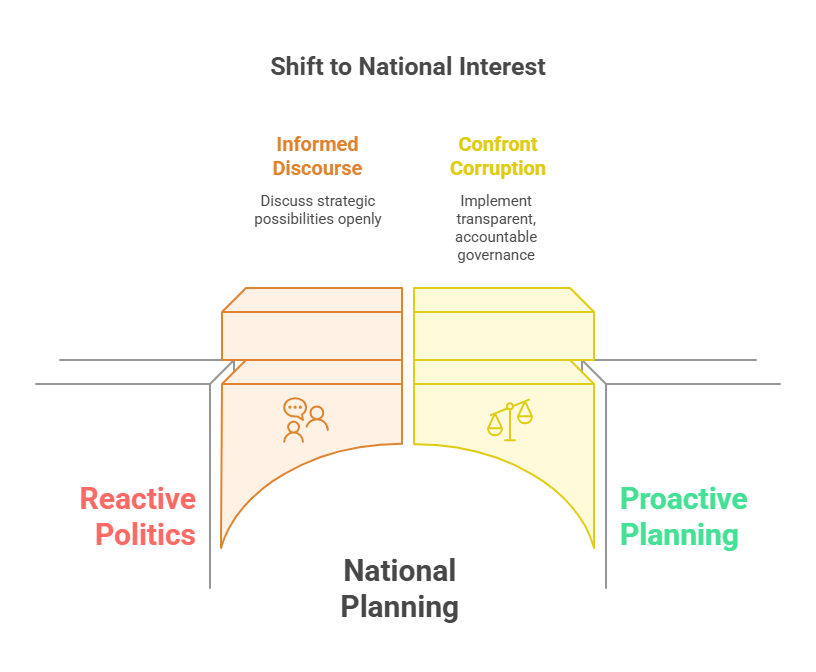
Conclusion: Reclaiming Destiny from Geography's Grip
Lebanon's geography is not an unchangeable determinant of its fate. While it presents undeniable challenges, it also offers a unique, albeit difficult, opportunity for strategic leverage. By consciously and intelligently choosing a path of active neutrality and strategic indispensability, Lebanon can redefine its geopolitical role. This strategic foresight and national agency can attract needed capital, retain its invaluable talent, and build a more resilient and prosperous future, ultimately transforming its geographic burden into a unique competitive advantage.